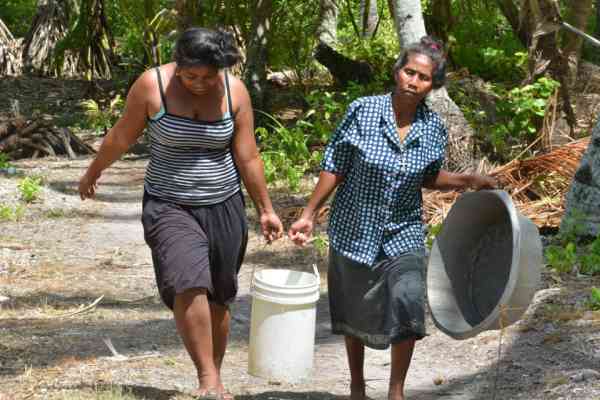KIRIWATSAN Phase 2 - Kiribati Water and Sanitation in the Outer Islands
A partnership funded by the European Union
Over 9,000 people in 35 villages across the 16 outer islands of the Gilbert group in Kiribati now have improved access to water and sanitation facilities as a result of a five-year water and sanitation project.
The Kiribati Water and Sanitation in Outer Islands Phase II project, better known as KIRIWATSAN II was implemented by the Government of Kiribati and the Pacific Community (SPC) with European Union funding of 3.185 Million Euro (4.75 Million AUD). The program was launched in August 2014 to improve water and sanitation in eight islands of Kiribati’s Gilbert Group. New water and sanitation infrastructure was established in the targeted areas and a capacity development programme was put in place to help maintain and improve existing water and sanitation infrastructure in all 16 islands of the Gilbert Group.
On 4th June, the people on the atoll island of Maiana, located 50km from the Capital Tarawa, held a special celebration to commemorate the official handing over of the completed projects under KIRIWATSAN II. The 8 villages on Maiana are the first to mark this milestone occasion.
The Minister for Infrastructure and Sustainable Energy Hon. Ruateki Tekaiara accompanied by Ms Marta Brignone from the Delegation of the European Union for the Pacific and the Pacific Community’s Deputy Director Disaster and Community Resilience Programme Ms Rhonda Robinson travelled to Maiana for the milestone occasion.
Reflecting on the achievement of the program Hon. Tekaiara paid tribute to the EU and SPC “You committed yourselves to work with us and for us but more importantly understanding the needs of the people of Kiribati. Your long hours of work, sweat and dedication for the people of Kiribati to provide clean and sustainable drinking water will change our lives. We will no longer have to or see our children, mothers, fathers and wives walk long distances three to four times a day to get clean drinking water or be concerned about hygiene with the newly constructed compost flush toilet facilities.”
While addressing the community members Ms Brignone stated the importance of collaboration and partnership which brings together science, innovation and technology “Dialogue is key and partnership is key if we want to make change and allow all stakeholders to better understand each other and find ways to address your needs and expectations. The KIRIWATSAN projects concludes in August 2019, and proves as a prime example of a project designed with long term sustainability through such collaboration and understating in mind.”
The project design was guided by and built on the work done under the preceding KIRIWATSAN Phase I project, which was also funded by the European Union and co-implemented through UNICEF and SPC.
In addition to community education and behaviour change initiatives, KIRIWATSAN I undertook a series of water resource assessments which enabled a thorough and informed consultation process with each of the 35 participating villages under KIRIWATSAN II. The consultations enabled communities to discuss and agree on options for water supply prior to construction under Phase II. The highly participatory consultative process involved island councils, village heads and other community leaders and resulted in ownership of and shared responsibility for the installed infrastructure. The water resource assessments were also valuable in helping communities develop a better understanding of their own water resources and how best to manage them.
Media contacts:
For media enquiries about the EU in the Pacific region please contact:
Nazeem KASIM, Press and Information Officer, Delegation of the European Union for the Pacific Suva, Fiji | [email protected]
For information on the KIRIWATSAN project, please contact:
Pauline Komolong, Pacific Community (SPC), Project Manager, SPC | [email protected]
About SPC:
The Pacific Community has been supporting sustainable development in the Pacific, through science, knowledge and innovation since 1947. It is the principal intergovernmental organization in the region, owned and governed by its 26 member countries and territories. www.spc.int | [SUBSCRIBE to SPC mailing list]
